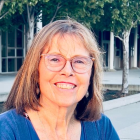Thank you for helping us meet our fundraising goal!
These in-their-own-words pieces are told to Patricia Lane and co-edited with input from the interviewee for the purpose of brevity.
John Redfern has no plans to retire any time soon. He is busy bringing energy independence to the world. I caught up with this Calgarian, who founded and runs Eavor Geothermal, in Marrakech, Morocco, where he was attending a meeting with his investors.
Tell us about Eavor.
We use next-generation geothermal technology to create clean, reliable, affordable energy that can be scaled globally. We do not contaminate aquifers, use fracking, use excessive amounts of water, pollute water or increase earthquake risk. Our land footprint is insignificant and power production is entirely reliable, which are advantages over solar and wind. We use no pumps, so energy generation is highly efficient. We can work well where there is water scarcity without depriving the people in the area of the water they need for life.
We drill a well far below the earth’s surface and then, send out lateral wells from it to form a hermetically-sealed, closed-loop radiator. Hot water rises to ground level where we generate other forms of energy like electricity from it. Once cooled, the water naturally flows back into the inlet to be heated again. We know exactly how much power is going to be produced for at least the 30 years we have modelled and with a confident prediction for 100 years or more. Our name comes from the word “endeavour” without the first syllable “end.” Our work has no end date.
We ran our first proof of concept outside Rocky Mountain House in Alberta in 2019 and have shown it works over five years with wells sunk in stable sedimentary sandstone. Our second project demonstrated its reliability in hotter, deeper rock in New Mexico in the exact location where fracking efforts for both traditional geothermal and gas had failed. Our first commercial build is just outside Munich in Bavaria, Germany. It will provide distributed energy to two communities by 2025.
How did you get into this work?
In 2018, I was working in another start-up in China and came back to Calgary for a visit. The oil and gas industry was in one of its characteristic downturns and all my friends were depressed. The only game in town was rehabilitating orphan wells to allow grass to grow over them and was projected to cost $85 billion. I thought there had to be a better use of that money. Geothermal came to mind, and frankly, I was shocked that no one was doing it.
A Shell Oil company executive listed ten reasons why oil and gas companies would never back geothermal. The technology known to them demanded reliance on the existence of geysers or other forms of hot water close to the surface. For this and other reasons, they did not view geothermal as scalable. We developed a different technology which meets all those concerns.

What makes it hard?
It's a start-up, and we are doing something new. Like a lot of clean technology, our initial capital outlays are hundreds of millions of dollars. This can be stressful. But there is no risk-free option. It is an illusion to think that if you work for a big company you are secure. Most work that has meaning has some stress attached to it. Compared to my daughters, who work in health care and must cope with life or death decisions, my work stress is much less intense.
What gives you hope?
This is the most rewarding thing I have ever done. Everyone from my kids to my parents loves the idea once they understand it. My friends in the oil and gas sector don’t like to think about climate change. I get it. No one wants to be the turkey talking about Christmas. But I get to help them make the transition by valuing their skills and knowledge as a path to a clean energy future.
Fracking is banned in Europe. Germany and the European Union welcomed us with large grants and big media announcements. The local people here are excited they will see history in the making when our project begins providing their power, independent of Russia, without damaging their land, water or air.
Our technology is still expensive. I take heart knowing that solar and wind went from costly to the cheapest form of energy in a surprisingly short time. This will happen with our work too.
What do you see if we get this right?
Every small town or large country has energy independence.
What would you like to say to young people?
Most of the young people I know want their work to provide them with a sense of mission or purpose. It is worth looking for.
What about older readers?
Why would you retire if your work is interesting, and you can contribute to a better world? My friends all hang out at the golf club with people their age. I get to work with young people from all over the world. My mind stays open, and I gain new perspectives every day.






Comments
Well done!
The genius behind of the closed loop system is its simplicity. Canada needs to invest in this company and technology, to put it at the top of the list well above the idiocy of enormous CCUS subsidies that only increase the distance the oil and gas industry will eventually fall.
Innovation like this also offers Canada a major step toward exporting exemplary homegrown technology from the start as well as wholesale adopting it at home, something we've become notoriously bad at carrying through to full commercialization.
All the best of success to you, Mr. Redfern.